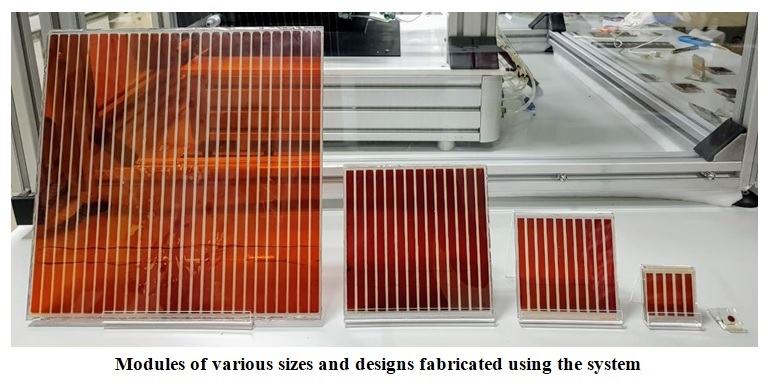India’s search for low cost alternative energy revealed a new star at The National Institute of Interdisciplinary Science and Technology (CSIR-NIIST).
With the support of the Department of Science and Technology, The NIIST researchers have developed an indigenous semi-automatic fabrication unit for manufacturing dye sensitized solar cell (DSC) based modules.
The entire equipment which was developed by the CSIR-NIIST partnering with Elixir Technologies, Bangalore helped reduce cost of fabrication equipments to more than 60% leading to true import substitution.
 The fabrication process, molecules and materials were optimised keeping in mind end user requirements and applications thereby developing international competency in this photovoltaic sector. It is installed at CSIR-NIIST and has been selected on PMOs high priority implementation category.
The fabrication process, molecules and materials were optimised keeping in mind end user requirements and applications thereby developing international competency in this photovoltaic sector. It is installed at CSIR-NIIST and has been selected on PMOs high priority implementation category.
DSCs contain synthetic dyes and harvests light by mimicking photsysthesis. Their advantage lies in their ability to generate power from low levels of exposure to light including indoor lights like CFl, LED etc.
The cells are easy to integrate to a variety of substrates including glass, metal and plastic and have high power conversion efficiency at indoor, ambient or diffused intensities. The efficiency is also independent of angle of incidence, intensity and nature of incident light.
The cell can be used in powering IoT smart devices, smart meters, water and energy management, smart parking, self-powered sensors, portable devices like those integrated in phones, tablets, mobile charging stations, backpack, in clothes and also solar power windows or aesthetically beautiful power producing glass windows.
By contributing towards smart agriculture, energy, urban and water management in a more environmentally friendly way the initiative will lead to the improvement in quality of life along with economic and industrial growth.
Experts predict that by 2020, there will be around 50 billion connected smart devices in the internet of things (IoT) domain which will be powered by batteries. Considering a 3-year lifespan, there will be more than 900 million battery replacements per year which eclipses the benefits of IoT sensors due to additional cost for monitoring and replacing these batteries. In addition, replacing the batteries/extending its life cycle can tremendously reduce the carbon foot print caused by its disposal.
In this rapidly changing scenario, conventional solar technologies may not be a suitable choice for indoor environments. This is where the unique advantages of dye sensitized cell (DSCs) which is an efficient third generation indoor light harvesting technology, become extremely important.By developing indoor light harvesting photovoltaic cells, self-powered sensors can be realized and the battery life can be extended. With indigenous manufacturing of panels by working with an industry the technology can cater to a paradigm shift in low cost self-powered smart devices for future smart cities which are environmental friendly.
sensitized cell (DSCs) which is an efficient third generation indoor light harvesting technology, become extremely important.By developing indoor light harvesting photovoltaic cells, self-powered sensors can be realized and the battery life can be extended. With indigenous manufacturing of panels by working with an industry the technology can cater to a paradigm shift in low cost self-powered smart devices for future smart cities which are environmental friendly.
India needs to develop expertise in manufacturing production equipment for photovoltaic technologies. The country had been depending on technologies elsewhere and was importing them at a high cost. The NIIST fabrication unit has addressed this gap to a great extent and at a much lower cost.






























